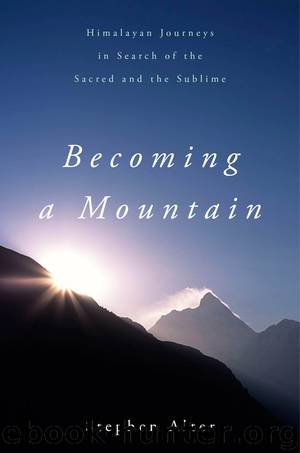Becoming a Mountain by Stephen Alter

Author:Stephen Alter
Language: eng
Format: epub
Publisher: Arcade Publishing
Published: 2015-01-01T05:00:00+00:00
A good many writers are walkers too. Edward Hoagland, in his collection of essays, Walking the Dead Diamond River, tallies up some of the pedestrian achievements of English poets: “Samuel Taylor Coleridge is said to have walked as far as forty miles in a day, and Carlyle once logged fifty-four in twenty-four hours on a walking tour. Wordsworth, the champion in this league, was calculated (by De Quincey) to have toted up 175,000 to 180,000 miles in a lifetime of peregrinations afoot. ‘I have two doctors,’ said Sir George Trevelyan of English-style walking, ‘my left leg and my right.’”
Though he doesn’t quote Thoreau, Hoagland refers to his legacy. “The American brand of walking of course has a different mystique, almost forgotten lately, which dates back to the frontier and has little to do with the daily ‘constitutional’ and therefore should be exercised in a setting so brawny and raw that the mileage can’t even be guessed.”
In search of this experience, and disillusioned by the war in Vietnam, Hoagland uprooted himself from New York City in the 1970s and purchased a farm in upstate Vermont, with a hundred acres of woodland. Here he could walk freely in the forests surrounding Mount Hor, one of the least developed regions of New England. Yet even in this isolated Eden, he writes about an awareness of limits: “Against the sense of exuberant release I felt on long walks in the woods was the knowledge that this in fact was just a hermetic patch of wilderness with highways on all sides, scarcely larger than a park: it was a ship in a bottle, and I was only hiding out.”
This problem afflicts us all, both as writers and as walkers, the shrinking margins beyond which our natural surroundings no longer extend. In the Himalayas, as much as any other place on earth, there is a growing sense of containment, even in the wildest forests and remote valleys. Except on the highest peaks, we are never more than a day’s walk from some kind of settlement. As the network of roads expands along rivers and over ridgetops, the world of concrete, polythene, and human ordure proliferates. India’s ballooning population, well over a billion now, includes growing numbers of Himalayan residents, as well as seasonal migrants. On one level, it seems selfish, perhaps unethical, to complain about a walk in the woods being disturbed by the encroaching needs of those who struggle for a meal each day. But conservation is a good and righteous thing, just as important as the alleviation of poverty. Some activists have shown that the two objectives complement each other. In the race for survival, however, human beings have a distinct edge over other species, and the natural world is becoming more and more constricted and polluted by the day.
It will be a sad moment when every trail in the mountains leads to a dung heap, and one cannot walk for a couple of miles, up or down, without crossing a motor road where the exhaust fumes of vehicles foul the air.
Download
This site does not store any files on its server. We only index and link to content provided by other sites. Please contact the content providers to delete copyright contents if any and email us, we'll remove relevant links or contents immediately.
Asking the Right Questions: A Guide to Critical Thinking by M. Neil Browne & Stuart M. Keeley(5775)
Autoboyography by Christina Lauren(5235)
Eat That Frog! by Brian Tracy(4540)
Dialogue by Robert McKee(4404)
Sticky Fingers by Joe Hagan(4198)
Journeys Out of the Body by Robert Monroe(3624)
Annapurna by Maurice Herzog(3467)
Full Circle by Michael Palin(3450)
Schaum's Quick Guide to Writing Great Short Stories by Margaret Lucke(3381)
Elements of Style 2017 by Richard De A'Morelli(3350)
The Art of Dramatic Writing: Its Basis in the Creative Interpretation of Human Motives by Egri Lajos(3067)
Atlas Obscura by Joshua Foer(2962)
Why I Write by George Orwell(2953)
The Fight by Norman Mailer(2940)
The Diviners by Libba Bray(2937)
In Patagonia by Bruce Chatwin(2930)
The Mental Game of Writing: How to Overcome Obstacles, Stay Creative and Productive, and Free Your Mind for Success by James Scott Bell(2908)
Venice by Jan Morris(2573)
The Elements of Style by William Strunk and E. B. White(2473)
